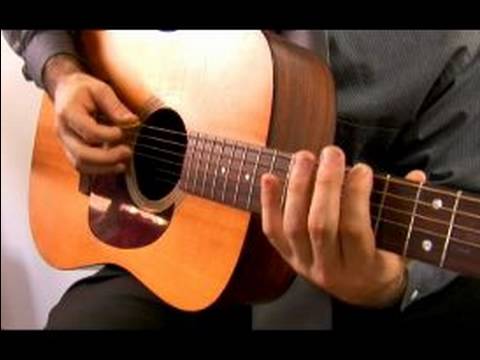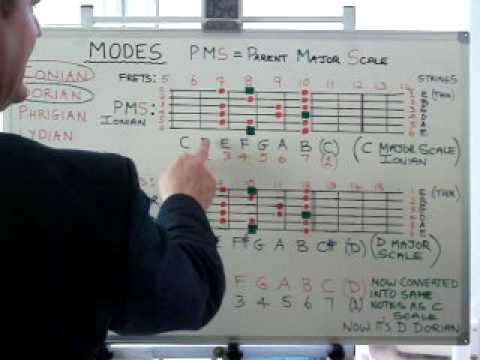www.fretjam.com Modes and modal theory is often seen as more complex than it actually is. Learn what modes are and how they differ from regular scales. We start with the modes of the major scale and how each degree of the major scale marks the start of a new mode… More on modes here – http Video Rating: 4 / 5
You may also like
Introduction To Guitar Modes – Guitar Lesson
Added by Admin 11 years ago
915 Views1 Comments0 Likes
Get instant access to FREE guitar lessons at GuitarLessons.com . Learn how to play the 7 guitar modes in these guitar lessons! This section will run through all seven guitar modes and show a...
Modes & Guitar Solo Techniques: Music Lessons : Playing the Seven Guitar Modes in E Major
Added by Admin 11 years ago
663 Views0 Comments0 Likes
Learn how to play the seven 7 musical guitar modes in the key of E major in this free music lesson on video. Expert: Casey Cormier Bio: Casey Cormier has been playing both the guitar and bass for 10 years. Filmmak...
What Are Modes, How Are They Made, And Why? Easy Lesson Explaining A Complex Subject
Added by Admin 11 years ago
4.50K Views25 Comments0 Likes
What Are Modes, How Are They Made, And Why? Easy Lesson Explaining A Complex Subject. The subject of Modes can drive fear into the most seasoned of Guitarists & musicians but, it need not be...
German Schauss Guitar Quick Tip – “Using Modes on Guitar”
Added by Admin 11 years ago
1.06K Views1 Comments0 Likes
LAMA Guitar Instructor German Schauss discusses using different modes on guitar. www.lama.edu Video Rating: 4 / 5









I really don’t get all the hub-bub about this guys voice. He’s from fucking England, and he has an accent. Wow, right? It’s almost as if these comments are from 15 year olds on their junior-high school library computers. Regardless of his pace or inflection, this -IS- an instructional video, and he’s not a bloody actor. The focus should be on clear, articulated information; not a swooning narrative with Shakespearean prose.
Anywho, very nice video, thanks!
with your accent you sound like del preston from wayne’s world 2.
Someone somewhere will always bitch about something. Nice lesson. Thanks.
Entiendo perfectamente la voz de Mike y su Northern English accent, resulta muy clara, nítida, agradable.
daysoftheweek1980:
Es necesario criticar semejante nimiedad porque no le resulta claro SU Inglés???. Hablo y escribo español, sin embargo, le entiendo perfectamente.
Nos brinda su tiempo y esfuerzo.
El punto es que enseña, acaso no basta?.
Démosle Like, si entendemos sus enseñanzas.
Mike… Best Regards! Gracias por tus videos!
Anywhere daysoftheweek1980… Best Regards!
No it isn’t. He speaks clearly and makes sense.
Nothing wrong with your voice mate. I’m Aussie and I can understand you clear as daylight. You have to wonder if the commenter is English speaking or not.
And you’re quite right in the 2nd video, music theory seems to complicate explanations unnecessarily.
Thanks, that is actually constructive criticism and I’m sorry if my reply seemed a bit knee-jerk.
I know what you mean. All my videos are scripted because I have trouble articulating a lot of the information on the fly and I want to make sure the info is correct and precise. It does sound a bit formal as a result, but it means I can pack a lot of info into a 5-10 minute video.
I’m the kind of person who hums and hars a lot, so I’ll need to work on loosening things up. Cheers.
Actually I think you are trying to be to instructive with the tone and pitch of your voice. If you spoke more naturally and just let it flow it would be sorted. Trainee actors have the same problem cos they can’t get into the fact they are acting and constrict their voice to much to try and sound like they’re not acting and it doesn’t work
Well i’m southern English… Portsmouth to be precise but I don’t know what it is but keep doing the vids anyway mate
Not another one. Is it the Northern English accent or the fact I sound like I’ve not slept for a week (or both)? If I had the money to hire a voice-over artist I would, but in the meantime you’re stuck with me, I’m afraid.
Good videos but the guys voice narrating is really annoying with the way he speaks
“An error occurred.Please try again later.”What’s wrong?I use firefox,having installed the flash player plugin.Why can’t I still load this video?I mean that I can load almost all the other videos in youtube except the videos uploaded by fretjamdotcom.Can anyone answer my question here?I really need help.
There is actually a SINGLE SIMPLE SCALE PATTERN for all diatonic scales/modes that works everywhere on the neck.
Search “Universal Scale” on amazon
That depends on what’s going on in the background. If you played any mode of C major over a C major chord or bass note, it would all sound like C major. The tonic root of the backing chords/note needs to correspond with the root of the mode you’re playing. Parts 2 and 3 go into that in more detail. In short, the backing chord(s) put the mode into context.
So when you play in a different mode does the new root note become what key you are now playing in? Like if the parent scale were a C major, and then I played the second mode of that scale, would I now be playing in the key of D, or would it still be C?
I finally get it
At last, it all makes sense now. Great video.
Thanks a lot for that. Cheers.
Correct! The F major backing chord (or even just a bass note) would put the note sequence into context. Good point about the parallel/relative distinction. I will expand on this at some point.
It becomes clear in your video at 3:36 what modes are.This is when you show the interval steps for the Mixolydian Mode, below the interval steps for the Major/ Ionian Mode. The point I’m trying to make is that it makes clear the distinction between the “Parallel Method” of looking at modes and the “Relative Method” of looking at modes. So if I am in F Major, and I play notes from C – Bb, using these intervals, does it mean I have played the C Mixolydian scale? Thanks.
Wow, this is awesome, really appreciate the vid. You’ve explained this very well and I’m very grateful for your effort.
Sorry that should be Locrian…
Yes that seems to work for Ionian & Dorian, not so much Phrygian it sounds a bit awkward to my ears, but then (minor) Phrygian is an awkward mode in general! Mixolydian sounds good on the 4th degree and Aeolian would just be relative A minor pentatonic (5th degree of C major pentatonic). To me it’s only really Phrygian and Locarian that aren’t “compatible” with this kind of pentatonic positioning. Thanks for raising a valuable point.